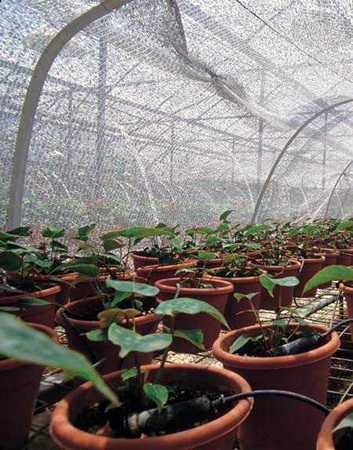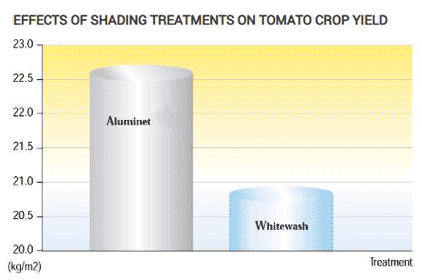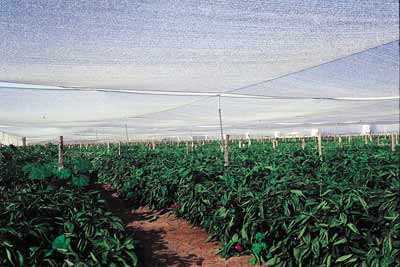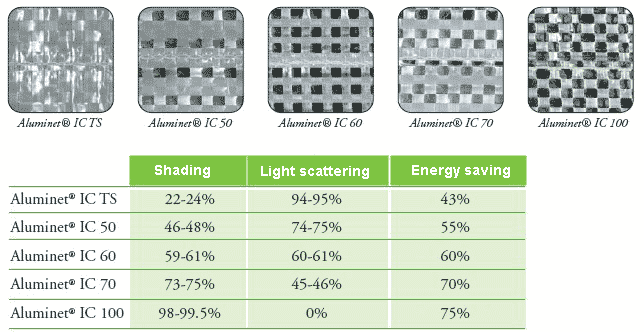
Special agricultural nets. Energy-saving net Aluminet
Energy is becoming more expensive, and it is susceptible to the cost of vegetables and other crops are grown in greenhouses. Therefore, the issue of maximum economical use of energy resources is becoming more and more relevant. For these purposes, special Aluminet® nets were developed, which are very effectively used as special thermal screens designed to save thermal energy.
Features and advantages of Thermo screens Aluminet
 Energy-saving.
Energy-saving.
It has been experimentally proven that using Aluminet® thermal screens saves up to 75% of thermal energy, which makes it possible to significantly reduce production costs in greenhouses.
Increasing crop yields.
Thermal control and providing optimal lighting are key factors for increasing yields in greenhouses. Aluminet® screens raise the temperature of plants at night, prevent overheating during the daytime, and contribute to better photosynthesis by increasing the amount of diffused light.
Frost protection.
Aluminet® screens installed in greenhouses protect plants from frost and reflect the radiation that emanates from the soil at night during the cold time of the day.
Warranty.
Aluminet® screens are supplied to customers accompanied by a guarantee with the expectation of long-term use in various, including adverse, climatic conditions. Production at the enterprise is carried out in full compliance with ISO 9002 and IQNet standards.
How do Aluminet® screens work?
Bilateral reflection of light.
Aluminet® screens lower the temperature during the daytime by reflecting solar radiation into the atmosphere. At night, the temperature inside the greenhouse rises and possible frost losses are prevented due to the reflection of thermal radiation by the Thermo screens and its return inside.
Light scattering.
Due to its unique design, Aluminet® thermal screens optimally diffuse light.
The use of special additives in the production, as well as the reflection of light by interlaced Aluminet® threads, contribute to the efficient distribution of solar radiation and the illumination of the maximum leaf area of plants.
Key Features of Aluminet® Screens
• UV Resistance
• Bilateral reflection of light
• Low weight and easy installation
• The possibility of recycling
Aluminet® in the production of seedlings and planting material.
 High-quality planting material for many crops is the key to success in their cultivation. It is very important for seedlings, saplings, and other planting materials to create optimal and most suitable for each crop microclimate conditions in the seedling greenhouse. One of the main negative factors is overheating, sunburns during the day in bright sunshine, and excessive cooling of plants at night. In a transplanting greenhouse, the microclimate should be soft and stable, without large differences in temperature, humidity, and light.
High-quality planting material for many crops is the key to success in their cultivation. It is very important for seedlings, saplings, and other planting materials to create optimal and most suitable for each crop microclimate conditions in the seedling greenhouse. One of the main negative factors is overheating, sunburns during the day in bright sunshine, and excessive cooling of plants at night. In a transplanting greenhouse, the microclimate should be soft and stable, without large differences in temperature, humidity, and light.
The use of the Aluminet® nets in the rooting of cuttings, in the cultivation of seedlings and pot crops, allows creating in small volumes of seedling compartments of greenhouses optimal conditions for temperature and light.
These nets also help maintain optimum moisture in the seedlings compartment.
Soft, diffused light, almost completely eliminates overheating and sunburn of tender leaves of seedlings, which increases the yield of products, improves the appearance and quality of plants, reduces the time for growing seedlings.
The use of Aluminet® is justified in greenhouses of any size and purpose, as well as in open ground for shading plants. Aluminet® Shade Net is the optimal solution for seedlings and seedlings.
Below are more details about the different uses of this type of agricultural net and the results of such an application.
To keep warm and protect from heat.

Whitewash.
An ancient, traditional, and primitive way to protect the greenhouse and the plants in it from overheating. How does it work? It works, but it is bad. It is difficult to paint the roof of the greenhouse completely and evenly with lime. Requires large labor costs and additional safety measures. Heavy rain washes paint and it has to be re-applied. After the summer season is over, whitewashing needs to be washed off, which also requires great labor costs, plenty of water, detergents, and labor. But it is not possible to wash off the whitewash completely. The transparency of the greenhouse cover decreases, which is very critical in the fall, winter, and spring, when the plants lack light.
The first shading nets were black, they gave a good effect, but Aluminet® turned out to be much more efficient.
On the left, the graph shows the results of using whitewash and black shading nets and Aluminet®. The results are quite eloquent.
ATTENTION!
In recent years, some greenhouses are using for shading a cheap building net of green color! This is unacceptable, as it affects the spectral composition of light penetrating into the greenhouse. The green net inhibits the growth and development of plants, retards fruiting and, in general, significantly reduces the yield of plants. The lifetime of such a net is also almost no more than one year.
Be careful when choosing the type of mesh to use for shading.
Aluminet® O screens for use in open ground
Using Aluminet® O nets for growing field crops, such as vegetables, for example, you can create a temperate climate and favorable conditions. Reducing temperatures and reducing the influence of direct solar radiation in the summer period contributes to improved crop quality and can also reduce water and fertilizer consumption. In greenhouses covered outside with Aluminet® O, plants are protected from wind and frost, and control of the humidity level is also improved. Working in such conditions increases resistance to diseases and also reduces the need for chemical treatments. In 2003, vast areas in which peppers were grown were severely frozen in northern Mexico. The plants survived only in structures (NetHouse) coated with Aluminet®. The light transmission coefficient was determined using ASTM-D 1746 and ASTM-D 1494 methods.
Shading screens Aluminet®
These screens save energy, shade plants, perfectly diffuse light, and do not interfere with the movement of air inside the greenhouse and ventilation. They are often used for Thermo screens and shading screens controlled by computer and driven by electric drive. Aluminet® I screens prevent the onset of heat stress and protect plants from frost. Bilateral reflection allows protecting plants from sudden changes in temperature during the day. The coefficient of light transmission is measured by the methods of ASTM-D 1746 and ASTM-D 1494.


Close Aluminet® IC screens for thermal energy saving
Close Thermo screens that save up to 75% of thermal energy. Used in greenhouses for closing at night and very efficient heat retention. They can be used both independently and together with shading screens. Aluminet® IC screens are designed specifically for use in greenhouses, installed in cold regions in order to reduce heating costs. Tests have shown that Aluminet screens reflect IC radiation and SAVE HEAT, which contributes to a significant reduction in energy consumption. The energy efficiency of the products was tested by the Dutch Institute of Standards INTRON, test No. R20010307, dated November 8, 2001.
Breathable screens Aluminet-I
100% Shade Aluminet DS & RDS screens are used in greenhouses to reduce light hours and 100% shading when growing crops such as chrysanthemums. Such screens are also extremely effective for saving energy.
If you need additional Aluminet information, please contact our sales department.
The network is produced from 2.1 meters to 10 meters wide and is delivered to customers in rolls, the length of which is determined in the order.